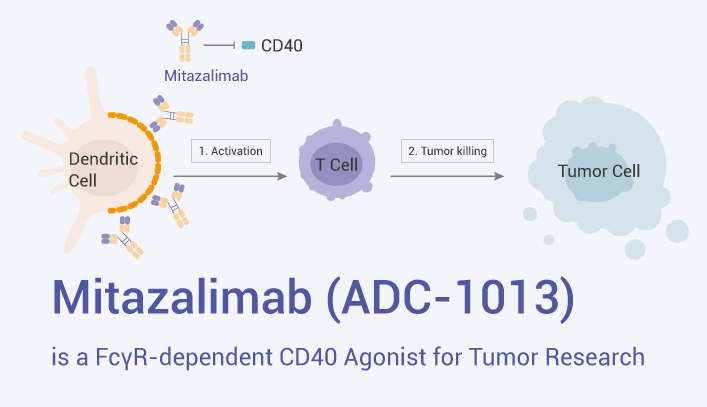CD40 is a cell surface glycoprotein and type I transmembrane protein present in antigen-presenting cells (APCs). Also, its ligand CD40L (CD154) is mainly expressed on T cells and platelets. The combination activates APCs, including dendritic cells (DCs), B cells, macrophages, and so on. CD40 signaling can lead to the upregulation of MHC molecules, co-stimulatory markers such as CD80 and CD86, and pro-inflammatory cytokines such as IL-6, IL-12, and TNF-α. Activation of CD40 also stimulates cross-presentation, inducing CD8+ T cell responses to tumor antigens. At the same time, it also promotes the killing effect of anti-PD-(L)1 antibody. Therefore, research on CD40 agonists in cancer research can effectively target tumors with insufficient APC activation and insufficient T cell activation leading to low T cell infiltration.
Here we will introduce an Fcγ R crosslinking-dependent CD40 agonist antibody, Mitazalimab. Unlike FC-γR crosslinking-independent antibodies, it can widely activate CD40 in the microenvironment regardless of CD40 expression.
Mitazalimab (ADC-1013) is a FcγR crosslinking-dependent IgG1 antibody, as well as a CD40 agonist for immune activation.
As for in vitro studies, Mitazalimab (0.01-10 μg/mL) activates tumor-associated macrophages (TAMs) from human prostate and ovarian tumor samples and alters CD83 levels. And it activates myeloid immune cells, may remodel the tumor microenvironment by inhibiting the function of immunosuppressive immune cells.
In naïve hCD40tg mice, Mitazalimab (100 μg/mouse; intraperitoneal injection; single dose) activates splenic dendritic cells and B cells, and leads to expansion of OVA-specific CD8+ T cells after OVA retreatment (200 μg; i.v.; 3 times for 7 days). In a mouse model bearing MB49 (mouse bladder tumor cell line), Mitazalimab (100 and 300 μg/mouse; intraperitoneal injection; days 7, 10, and 13 after tumor inoculation) also induces the release of pro-inflammatory cytokines and chemokines. It changes the composition of tumor bone marrow cells, reducing monocytes and macrophages, and increasing granulocytes.
In conclusion, Mitazalimab is a highly potent FcγR crosslink-dependent CD40 agonist that produces tumor-directed immune activation. It not only activates tumor-associated macrophages but also has the potential to remodel myeloid cells in the tumor microenvironment.
Reference:
[1] Deronic A, et al. 2021 Dec;70(12):3629-3642.
[2] Smith K E, et al. Cancer Research, 2022, 82(12_Supplement): 4155-4155.